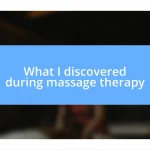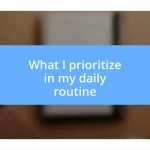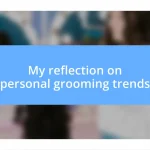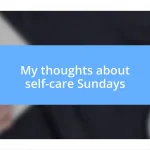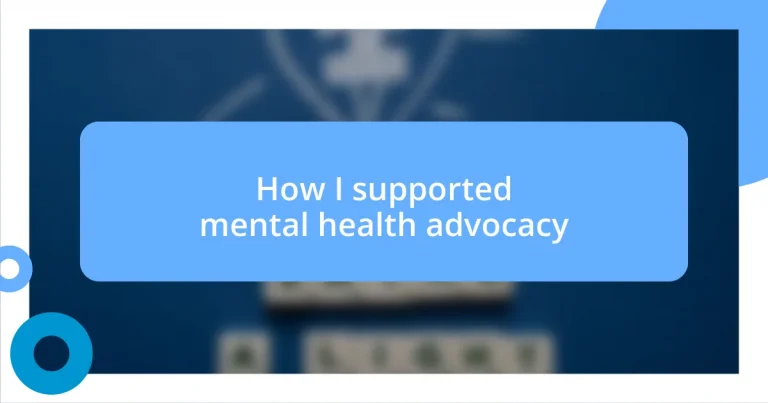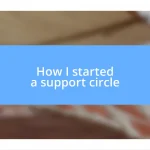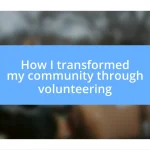Key takeaways:
- Mental health advocacy raises awareness, challenges stigma, and promotes policy reform to support individuals with mental health issues.
- Effective advocacy strategies include grassroots mobilization, social media campaigns, and collaboration with mental health professionals to enhance impact.
- Engagement with mental health organizations through events, workshops, and volunteering fosters community connections and promotes ongoing conversations about mental health.
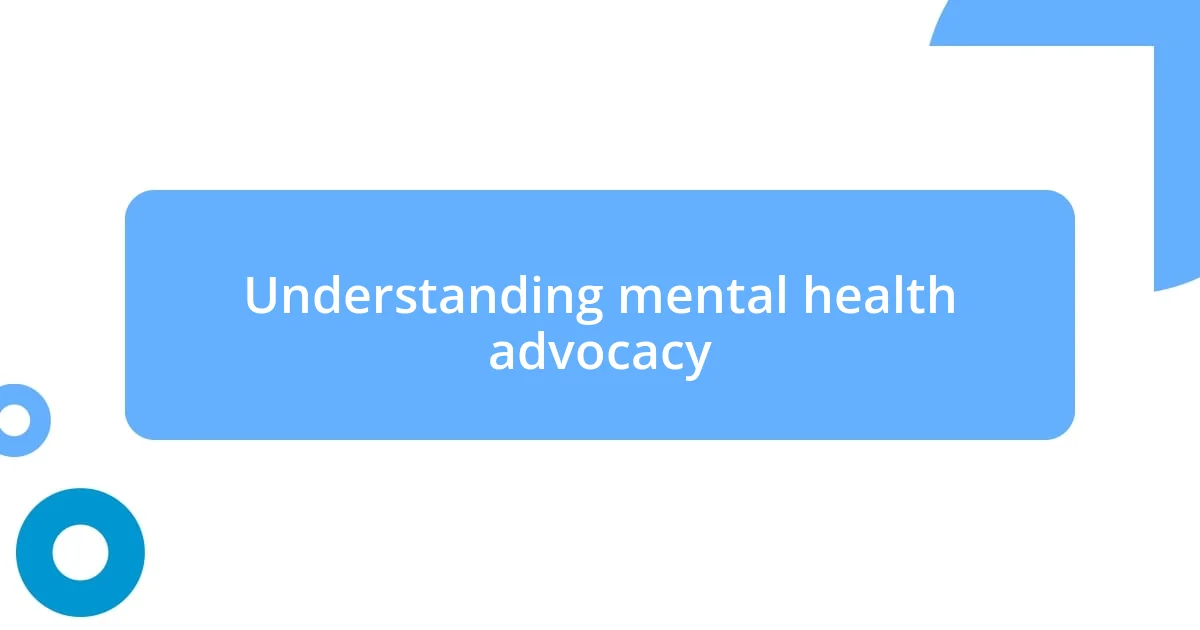
Understanding mental health advocacy
Mental health advocacy is fundamentally about raising awareness and creating a supportive environment for those affected by mental health issues. I remember attending a community meeting where a young woman shared her story of struggling with anxiety; her vulnerability inspired others to speak up. Isn’t it remarkable how one voice can ignite a movement and encourage others to seek help?
Advocacy also involves challenging the stigma surrounding mental health conditions. I once overheard a conversation where someone dismissed depression as just “feeling sad.” It hit me hard; misconceptions like these can prevent people from reaching out for support. If we don’t educate ourselves and others, how can we hope to bring about change?
An important aspect of mental health advocacy is policy reform. I’ve seen firsthand how local initiatives can lead to improved access to mental health services in underserved communities. When we unite our efforts and collaborate with organizations, we can make a tangible difference—so, how can you get involved in advocacy work? The possibilities are endless.
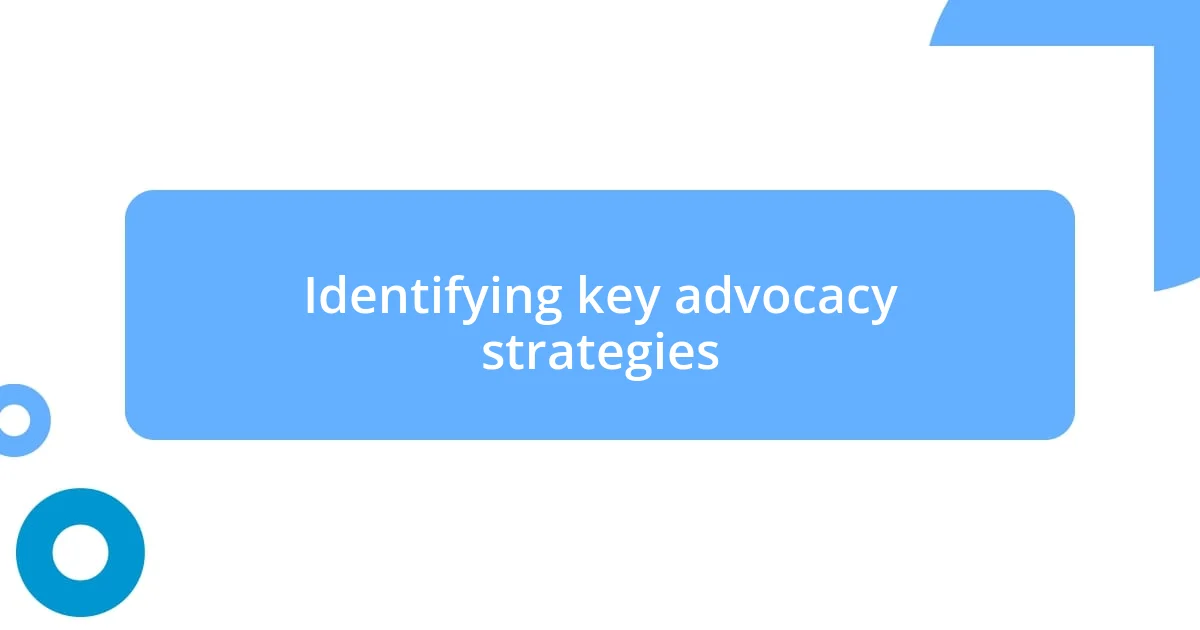
Identifying key advocacy strategies
Identifying effective advocacy strategies is vital for any mental health initiative. One approach I’ve found powerful is grassroots mobilization. I recall organizing a local walkathon for mental health awareness, which not only brought the community together but also raised funds for local services. The energy at that event reminded me how important it is to engage the community actively; it transformed awareness into action.
Another strategy involves leveraging social media platforms for campaigns. On one occasion, I initiated a series of online discussions focusing on mental health topics, which attracted a diverse audience. It was heartening to see how people began sharing their experiences and resources in real-time; the digital space can truly amplify voices in a way that unites us beyond geographical boundaries.
Finally, collaborating with mental health professionals can enhance advocacy efforts. During a meeting with local therapists, I remember brainstorming simple yet impactful workshops that could educate people on coping skills. It’s essential for advocates like us to connect with experts, as their knowledge helps ground our initiatives in evidence-based practices, making our arguments stronger and more persuasive.
| Advocacy Strategy | Description |
|---|---|
| Grassroots Mobilization | Community-driven events to raise awareness and funds, fostering local engagement. |
| Social Media Campaigns | Using online platforms to share experiences and create conversations around mental health. |
| Professional Collaboration | Partnering with mental health experts to ensure initiatives are informed and effective. |
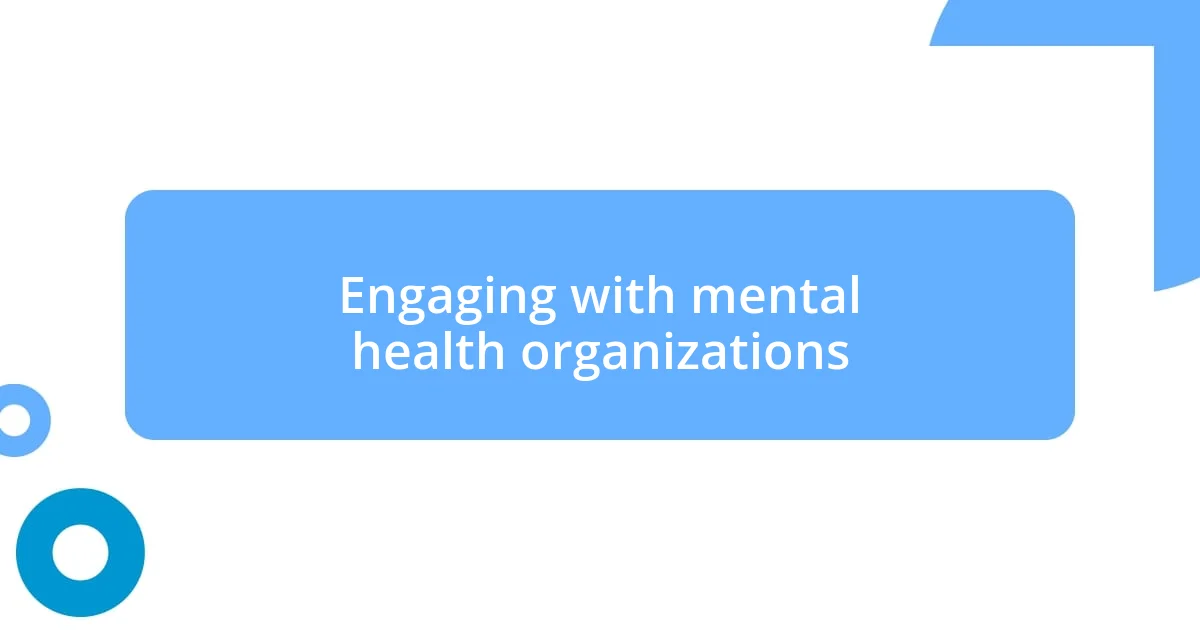
Engaging with mental health organizations
Engaging with mental health organizations has been a fulfilling part of my advocacy journey. I vividly recall the first time I volunteered at a local mental health fair organized by a respected nonprofit. The atmosphere buzzed with hope and community spirit, and I felt an immediate connection with individuals who dedicated their lives to supporting others. Sharing stories and resources with attendees opened my eyes to the vast network of people who believe in breaking the stigma—it’s a powerful reminder that we’re not alone in this journey.
One key way to strengthen this engagement is by participating in events that these organizations host. Here are some practical suggestions to consider:
- Attend Workshops: These offer invaluable insights and practical skills to advocate for mental health.
- Join Support Groups: Not only can you offer expertise, but you can also learn from real experiences shared by others.
- Volunteer Time: Dedicating hours to help with events or campaigns fosters connections with like-minded individuals and deepens your understanding of community needs.
- Collaborate on Projects: Proposing joint initiatives can significantly enhance outreach and resource-sharing.
Building relationships with mental health organizations is an ongoing journey filled with emotional rewards and learning experiences. Every interaction deepens my commitment, reminding me of the collective power we hold to create meaningful change.
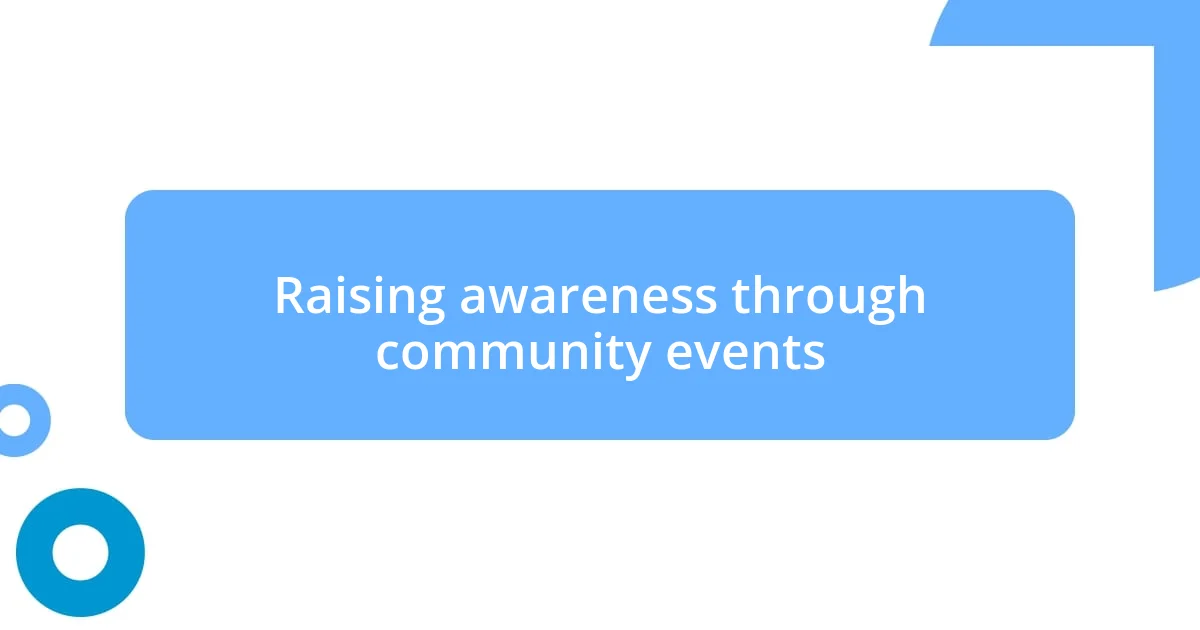
Raising awareness through community events
Raising awareness through community events is one of the most rewarding experiences I’ve had. I recall organizing a small art exhibition where local artists showcased their work around the theme of mental health. The conversations that sparked in the gallery were genuine and heartfelt; it was as if art acted as a bridge connecting people’s experiences, fears, and hopes. Have you ever noticed how creativity can break down barriers? It was evident that everyone left feeling a little more understood.
Additionally, hosting workshops focused on mental health topics can be incredibly impactful. I led a session on managing anxiety, and the room was filled with individuals eager to share their struggles. The vulnerability in that space was palpable—people opened up about their journey in ways I had never expected. Seeing participants share coping strategies brought forth a sense of community that truly uplifted everyone involved.
Community events also serve as a catalyst for ongoing conversations about mental health. I remember participating in an outdoor wellness fair, where attendees could access resources while enjoying a range of activities from yoga to meditation. The laughter I heard while people engaged in these practices was heartwarming. Sometimes, it’s the simple act of coming together in a relaxed, supportive environment that can shine a light on mental health, creating lasting awareness that goes beyond one day. Isn’t it amazing how a shared experience can foster community spirit and understanding?
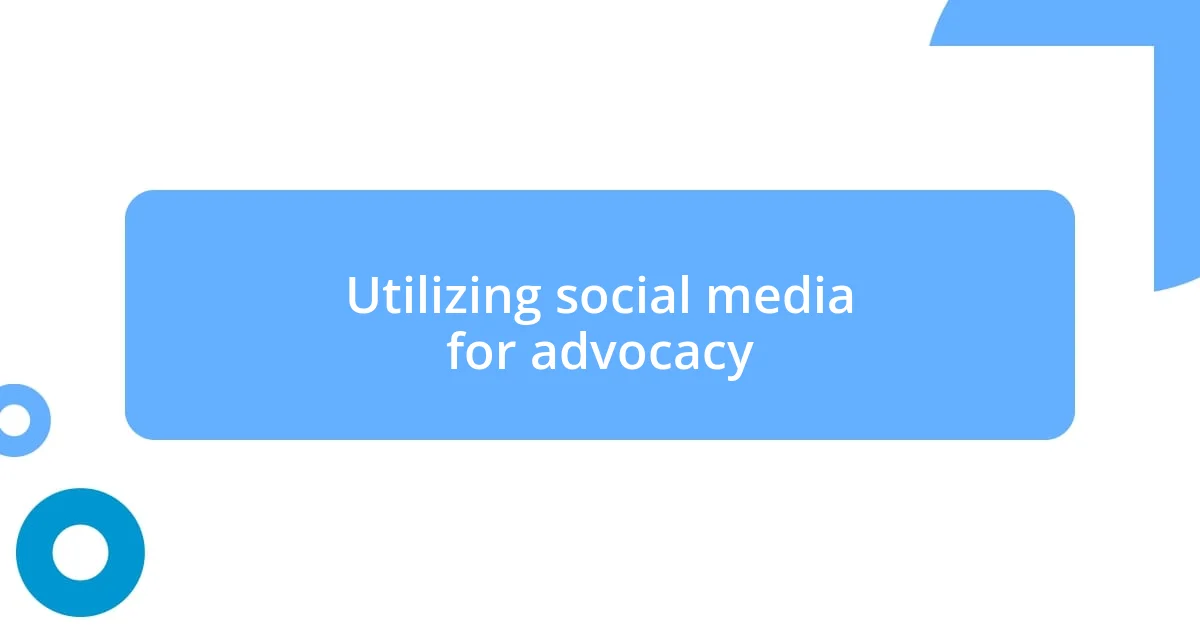
Utilizing social media for advocacy
Utilizing social media for advocacy has been an eye-opening journey for me. I remember the first time I shared my personal mental health story online. It felt vulnerable, yet liberating. What surprised me most was the flood of messages from friends and strangers alike, many expressing gratitude for my openness. It struck me that social media can serve as a powerful platform for connection, breaking down barriers while fostering conversations about mental health. Have you ever felt that sense of community online? It’s truly incredible how sharing your truth can resonate with others, leading to support and shared experiences.
I’ve also learned the importance of crafting engaging content that educates others. When I launch a campaign, I focus on creating vibrant graphics and informative posts aimed at raising awareness. For instance, I once created a series of infographics highlighting coping strategies for anxiety that reached thousands of people. That moment still fills me with pride because it showcased how creativity could simplify complex topics. Engaging visuals combined with heartfelt captions can ignite discussions that ripple through social media networks, transforming silent observers into active participants.
Moreover, leveraging hashtags has amplified my outreach tremendously. I once took part in a campaign centered around Mental Health Awareness Month using a specific hashtag and the response was overwhelming. People shared their stories, linked resources, and even offered help to one another—all catalyzed by a simple hashtag. Isn’t it amazing how a few words can unify voices into a collective force? My experience leads me to believe that harnessing the power of social media can not only foster a sense of belonging but also drive real changes in attitudes toward mental health.
